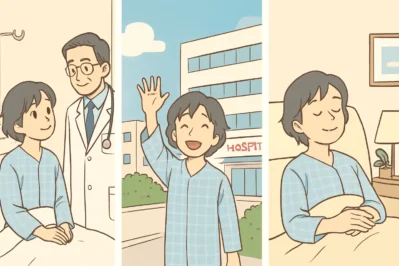Ouch! Talking About Your Surgery in Korean (수술 경험 말하기)
Hello! This is [Maeil Han-geul], here to upgrade your Korean skills!
Today, we’re going to tackle a topic that might seem a bit serious, but is incredibly useful: talking about surgery. Whether you need to visit a hospital in Korea, explain your medical history, or simply share a significant life event with a friend, knowing these phrases will make you feel much more confident.
Lately in Korea, medical dramas like Hospital Playlist and Dr. Romantic are super popular! You’ve probably heard the characters shouting “수술!” (surgery!) in dramatic scenes. After today, you’ll understand exactly what they’re talking about and be able to share your own experiences, too!
Let’s get started!
Core Expressions You Need to Know
Here are the essential phrases for discussing a surgery experience from start to finish.
1. 수술을 받다 (susul-eul batda)
- Pronunciation [Romanized]: su-sul-eul bat-da
- English Meaning: To have/undergo/receive surgery
- Detailed Explanation: This is the most common way to say you had surgery.
수술(susul) means “surgery,” and받다(batda) means “to receive.” So, you are literally “receiving surgery.” It’s a natural and standard expression used in all situations, from casual chats with friends to formal conversations with doctors.
2. 입원하다 (ibwonhada)
- Pronunciation [Romanized]: ip-won-ha-da
- English Meaning: To be hospitalized / To be admitted to the hospital
- Detailed Explanation: If your surgery requires a hospital stay, this is the verb you need.
입원(ibwon) is the noun for “hospitalization,” and하다(hada) is the verb “to do.” You can use this to say how long you were in the hospital (e.g., “3일 동안 입원했어요” – I was hospitalized for 3 days).
3. 퇴원하다 (toewonhada)
- Pronunciation [Romanized]: toe-won-ha-da
- English Meaning: To be discharged from the hospital
- Detailed Explanation: This is the opposite of
입원하다.퇴원(toewon) means “discharge from the hospital.” It’s the happy moment when you finally get to go home!
4. 회복 중이다 (hoebok jung-ida)
- Pronunciation [Romanized]: hoe-bok jung-i-da
- English Meaning: To be recovering / To be in recovery
- Detailed Explanation: This is a fantastic phrase for the post-surgery period.
회복(hoebok) means “recovery,” and the grammar pattern~중이다means “in the middle of doing something.” So,회복 중이다literally means “in the middle of recovery.” You can use this to let your friends know you’re getting better. For a polite version, you’d say회복 중이에요(hoebok jung-ieyo).
Example Dialogue
Let’s see how these phrases work in a real conversation between two friends, Minjun and Sora.
A: 민준 (Minjun)
소라 씨, 오랜만이에요! 그동안 잘 지냈어요?
(Sora, long time no see! Have you been well?)
B: 소라 (Sora)
아, 민준 씨! 네, 지금은 괜찮아요. 사실 지난주에 수술을 받았어요.
(Oh, Minjun! Yes, I’m okay now. Actually, I had surgery last week.)
A: 민준 (Minjun)
정말요? 괜찮아요? 그래서 입원했어요?
(Really? Are you okay? So, were you hospitalized?)
B: 소라 (Sora)
네, 3일 동안요. 어제 막 퇴원했어요. 지금은 집에서 회복 중이에요.
(Yes, for three days. I was just discharged yesterday. Now I’m recovering at home.)
A: 민준 (Minjun)
그랬군요! 푹 쉬고 빨리 나아요. 꼭 드라마 ‘슬기로운 의사생활’ 같네요!
(I see! Rest well and get better soon. It’s just like the drama ‘Hospital Playlist’!)
Culture Tip & Trend Insight
In Korea, the healthcare system is very efficient, but being in the hospital can still be a lonely experience. That’s why it’s a very common and warm custom for friends and family to visit someone who is hospitalized.
- Visiting Gift Culture: If your Korean friend is hospitalized (
입원했어요), it’s a nice gesture to visit them with a small gift. The most popular gifts are boxed fruit juices, vitamin drinks, or fresh fruit. It shows you care about their speedy recovery! - Openness About Procedures: While serious surgeries are a private matter, you’ll find that young Koreans often talk openly about minor procedures. Discussing things like getting wisdom teeth removed or having Lasik eye surgery (
라식 수술) is very common. So don’t be surprised if this topic comes up in conversation! Knowing today’s phrases will help you join in.
Let’s Review and Practice!
Great job today! You’ve learned four essential expressions for talking about a surgery experience.
- To have surgery: 수술을 받다
- To be hospitalized: 입원하다
- To be discharged: 퇴원하다
- To be recovering: 회복 중이다
Now, let’s test your knowledge!
Practice Question:
Imagine your friend just got out of the hospital after surgery. How would you ask them, “Are you recovering well?” in polite Korean? (Hint: Use 회복 중이다 and the word for “well,” which is 잘 (jal)).
Leave your answer in the comments below! We’d love to see you try using today’s expressions. Keep up the great work






